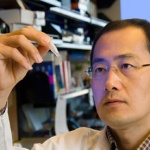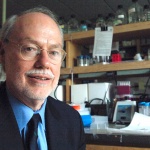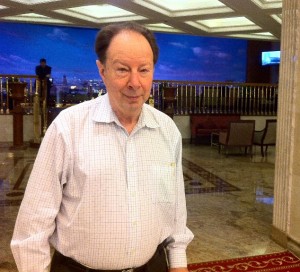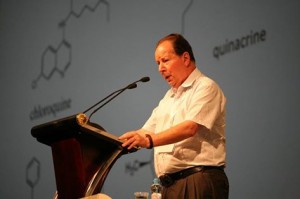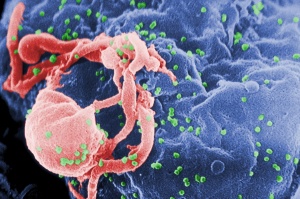
Scanning electron micrograph of HIV-1, colored green, budding from a cultured lymphocyte. Image courtesy of wikipedia
The HIV virus, which causes AIDS, has been the target of much debate and research over the last thirty years. Out of four enzymatic activities that it imposes on its host cells, three have been been successfully targeted by antiviral drugs. But one viral protein – Reverse Transcriptase – still eludes researchers and haunts humanity. Join us as Dr. Mikalai Lapkouski gives a seminar on a new initiative to tackle RT and ultimately save lives, titled “RNA Degradation By HIV-1 Reverse Transcriptase Protein”.
When: October 20, 2014; 13.30 – 15.00
Where: Beijing-1 Auditorium, China cluster; Skolkovo School of Management
SEMINAR ABSTRACT:
HIV-1 is a lentivirus and the etiological agent of AIDS, a global pandemic for more than three decades. The viral protein Reverse Transcriptase (RT) is essential for the replication of HIV as it converts viral genomic RNA into DNA, which integrates into the cell genome. In addition to its RNA- or DNA-dependent DNA polymerase functions, the viral RT contains an RNase-H activity, which hydrolyzes the RNA strand of an RNA/DNA hybrid.
Three of the four HIV-1 encoded enzymatic activities (protease, integrase and DNA polymerase) have been successfully targeted by antiviral drugs. However, drug resistance continues to pose a major challenge, and new viral and host targets for drug development are needed. No inhibitor of RNase H has advanced to clinical trials. To find an efficient inhibitor more information is needed of how RT recognizes, binds and acts on its nucleic acid substrates.
We used an X-ray crystallography and report three structures of HIV-1 RT complexed with a non-nucleotide RT inhibitor and an RNA/DNA hybrid. In the presence of he inhibitor, the RNA/DNA structure differs from all prior nucleic acid–RT structures. In our research we gained deep insight into the HIV-1 RT mechanism of action as well as explained RT mutations that confer drug resistance but are distant from the inhibitor-binding sites, which often map to the unique RT-RNA/DNA interface that undergoes conformational changes between two catalytic states.
SPEAKER INTRODUCTION:
Dr. Mikalai Lapkouski has graduated in year 2005 from Belarusian State University, biochemistry department in Minsk. He received his PhD from the Institute of Physical Biology, University of South Bohemia in Czech Republic. He then trained as a Postdoctoral Fellow at The National Institute of Diabetes and Digestive and Kidney Diseases, National Institutes of Health (NIH) in USA. He is currently working as a scientist at Centre for Structural Systems Biology/Karolinska Institute in Hamburg, Germany.
Dr. Mikalai’s interests are focused on the action of proteins and their complexes with other proteins as well as DNA and RNA molecules. These proteins and their complexes are involved in various crucial pathways in cell. It is important to study these molecules as mutations and malfunction in their action often cause serious diseases. Proteins, which come from pathogens and compromise human health, are also of a big interest.
The main methods he uses in his research are structural biology in tight alley with cell- molecular biology and biochemistry.
* The Skolkovo Institute of Science and Technology (Skoltech) is a private graduate research university in Skolkovo, Russia, a suburb of Moscow. Established in 2011 in collaboration with MIT, Skoltech educates global leaders in innovation, advances scientific knowledge, and fosters new technologies to address critical issues facing Russia and the world. Applying international research and educational models, the university integrates the best Russian scientific traditions with twenty-first century entrepreneurship and innovation.
